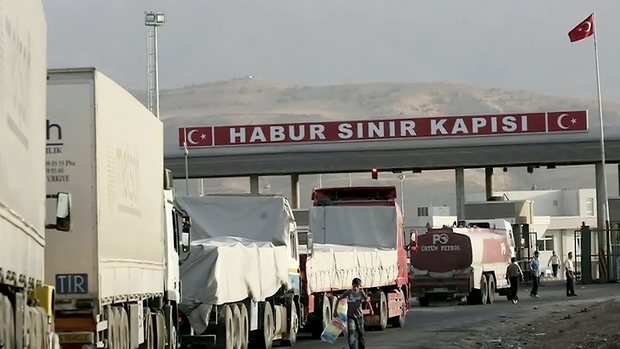How Romanian border control ‘froze’ Russian-Turkey warming
The flow of freight carriages to Turkey is growing. But they are delievered by carriers from neighbouring countries
Authorities of borderline Ukrainian regions inform that there are gigantic traffic jams and queues lasting for several days on the border because of a grown flow of trucks en route from Russia to Turkey. However, despite the announced renewal of commercial ties, bans on truck drivers continues being imposed. Carriers from Belarus, Moldova, Georgia and other former USSR countries are earning on it.
Trucks from Russia stuck in Ukraine again
Messages that trucks going from Russia stuck in Ukraine appeared yesterday, on 27 October. Gennady Moskal, the chairman of Zakarpattia Regional Administration, told about it. But a huge traffic jam on the border, not arrests like it was at the beginning of the year, is meant. According to Moskal, three-kilometre queues of several hundreds of trucks that go from Russia to Turkey appeared at Diakovo Security Control Point in Zakarpattia Oblast.
'Diakovo is the only security control point on the border between Ukraine and Romania in Zakarpattia region that passes trucks,' Gennady Moskal notes. 'After the Russian-Turkey relations warmed up (that worsened because a Turkish jet downed a Russian bomber), the flow of trucks from Turkey to Russia and vice versa has increased ten times. Many trucks return from Russia via Ukraine, Romania and Bulgaria.'
Moskal said Ukrainian border guards and customs workers are ready to register vehicles quickly. The jam arises because of the work of Romanian customs workers who are able to pass a maximum of one hundred trucks per day.
However, a representative of the Association of International Road Carriers in Kazan Aleksander Lindval told Realnoe Vremya that Russian trucks were not there. 'I have heard about it for the first time. I don't understand who can be in the queue. They are not Russians for sure.'
No visa, no permission
The explanation is very simple: there has not been any official renewal of carriers between Russia and Turkey. It should be reminded that in June Russia's President Vladimir Putin charged with starting a renewal of commercial relations with the Turkish Republic. It presupposed a renewal of freight carriages too. But it was far simpler to permit bring them Turkish fruits than do it with Russian and Turkish cars.
In December 2015, there was a problem with a permission for carriages. Due to the political crisis, the Ministry of Transport of Russia offered Turkey to exchange a reduced amount of permissions for 2016: not 8,000 by 8,000, like it was before, but 2,000 by 2,000. However, the Turkish side did not agree. Negotiations lasted for several months. At the same time Russia introduced a visa system unilaterally, including for Turkish truck drivers. In answer to that, Turkey imposed visas for drivers from Russia from 1 June. Despite the warming, the problem of freight carriages has not been solved yet.
'There has not been any exchange of permissions with Turkey. Nobody has canceled visas for Russian drivers yet,' says Lindval. 'There was no cancellation because visas are still needed. It is more difficult to exchange visas than permissions. As soon as visas are canceled, we will exchange the permissions during a week.'
It is still unclear to what extent carriages will be renewed. 'The team of the administration of the country is to renew the cooperation completely. It means to its previous level. I can't forecast what will happen in fact,' the expert tells.

Belarus, Moldova and Georgia conquering the market
While the Ministries of Transport of the two countries are thinking how to restore the relations, carriers are looking for alternative options. So Turkish truck drivers had to use, for example, the Caspian route. Goods are often delivered either via Azerbaijan or Belarus.
At the same time Turkish and Russian carriers are driven out by players from the former Soviet Union countries. Their vehicles create the traffic jams on the border between Ukraine and Romania.
'Now goods are delivered by carriers from third countries – Belarus, Moldova, Georgia has the right to deliver,' says Lindval. 'They have a special permission for that. In addition, it is no secret that Turkish products are supplied via Belarus. Turks supply goods to Belarus and then to Russia. In general, they find a solution.'